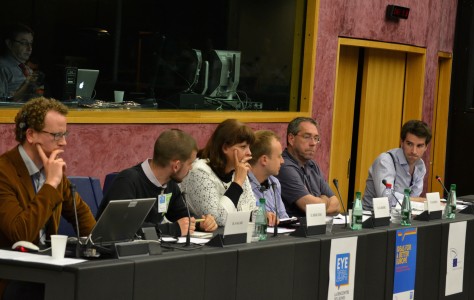Could Canada’s natural resources provide an alternative energy source for the European Union?
By Kait Bolongaro, Canada/France
At the European Youth Event 2014 in Strasbourg, the discussion surrounding the future of energy security was passionate and revealed the conflicted nature of energy policy in Europe. The looming role of Russia as the primary provider of energy for the Bloc dominated the panel “We got the power…” Participants debated with prominent panelists, including Edit Herczog, a Member of Parliament, and Alexander Ververken from energy giant GDF Suez, about the consequences of the European Union’s long-term dependency on Russian energy sources in light of the current crisis with Ukraine.
The energy tango
As Vladimir Putin celebrated the end of World War I in newly annexed Crimea, the de-escalation agreement to halt the crisis has floundered. The continuing dispute about Ukraine threatens to embroil Moscow and Brussels in a trade war and jeopardize energy security on the continent.
Canada is promoting itself as an attractive alternative to Moscow to ensure adequate power supplies. On Tuesday, the Energy Ministers from France, Italy, Germany, U.K., Japan and the U.S. met in Rome. As the sole major oil and gas exporter in the group, Canada is attempting to leverage this position to woo Europe.
Before the crisis in Ukraine, the European Union labeled the tar sands as the dirtiest form of oil. The proposed Fuel Quality Directive would effectively bar Canada crude from the European market. In light of the current circumstances, it appears that Europe’s stance towards Canada’s oil sands has softened in a feat of environmental backpedaling. However, is it truly in Europe’s interest to pursue such a relationship?
The European Union and the United States are already enforcing sanctions against 30 Russian and Ukrainian officials by freezing their assets and issuing travel bans. So far, restrictions have avoided targeting trade between the Bloc and their neighbour. Russia retaliated by threatening to cut off the gas supply to Ukraine and Europe, citing Ukraine’s unpaid energy bills.
However, the European Union is addicted to Russian energy. Moscow is the Union’s largest exporter of oil, natural gas, uranium and coal. State-owned Gazprom provides 30% of natural gas on the market. Member States import 35% of their oil from Russia and 20% of their uranium for nuclear power.
The energy markets in Estonia, Finland, Latvia, Lithuania, Slovakia and Bulgaria are 100% reliant on Russian energy, leaving them dependent on Putin’s whim. It is estimated that Europe could cope for only 90 days without Russian energy. This leaves the Bloc scrambling to replace energy sources on a continent that is not self-sufficient.
Challenging the Russian monopoly
There are some contenders attempting to challenge Russia’s dominance in the European energy market. Turkey, EU candidate country, is considered as a viable alternative to provide Europe with natural gas and oil via the Trans-Anatolian pipeline. Azerbaijan, another EU ally, is also another possible route to avoid Russia.
However, Canada is eager to become the replacement of choice. The country is in the final stages of agreeing to the Canada-EU Free Trade Deal and touts itself as a stable and reliable provider of energy. The northern behemoth produces 3.2 million barrels of crude per day and the number is expected to double by 2030. It holds the third largest proven oil reserves in the world, after Venezuela and Saudi Arabia. It has the third largest uranium reserves and ranks 20th for natural gas supplies.
The extent of Canada’s resources is actually unknown. As climate change severely alters the northern landscape, the Arctic is seen as the new resource frontier. Russia and Canada possess the largest portion of its territory along with Greenland, Norway, Sweden, Finland and the United States, leaving the European Union’s options limited in this zone.
Secure energy, but at what cost?
Although Canada’s natural resources have led to its wealth, energy production bears a heavy environmental price. The oil produced in Canada’s tar sands is the most toxic fossil fuel in the world. It pollutes more than conventional oil due to a higher presence of carbon and hazardous materials such as sulfur and heavy metals. This composition makes transportation and production of the crude more complicated. The extraction process is also more energy and water-intensive: producing one barrel of oil requires between 0.4 and 3.1 barrels of freshwater.
Most of Canada’s oil comes from the western province of Alberta. It is being drilled in the Boreal Forest, the largest intact forest on earth. This area is 3 million square kilometres or roughly the size of India. It is the world’s largest wetlands with important water resources amounting to 200 million acres of lakes and rivers. It is also home to thousands of species of animals and plants, many of which are endangered. The Boreal Forest is critical to stabilizing the global eco-system and mitigating climate change. It is the most important carbon store on the planet, with 11% of the total amount, making its conservation critical.
There is also a high human cost of the tar sands. Indigenous people, whose traditional territory is found in the region, are already suffering from higher rates of cancer and illness. Their water and food supply has been contaminated and threatens to destroy thousands of years of tradition. Eventually, this pollution will impact all North Americans as water from this area feeds into the rivers and lakes of the continent.
While Europe could have more energy security by turning to Canada instead of Russia, the question is if the EU is willing to jeopardize its reputation as a leader in environmental issues by purchasing oil from the tar sands, which it previously condemned. If the European Union doesn’t stand up for the environment, who will?












